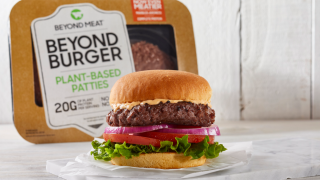Going vegan can seem like a huge commitment. As humans, we’re all scared of change. But changing your diet and going vegan or even simply eating a more plant-based diet is fantastic for the environment and for you. In 2021, going vegan has really never been easier. There are tons of vegan and vegetarian alternatives available.
Can I be an athlete and go vegan?
Pro athlete Kyle Buckingham, spoke to us about going vegan as an athlete. Buckingham first started his athletic career in 2008 when he completed his first ‘Ironman’ in South Africa and went professional in 2014. A year and a half ago, Buckingham made the decision to ditch meat and convert to a vegan diet. Both he and his wife went ‘cold turkey’ and haven’t touched meat since.

Kyle Buckingham I Longevity Live
But how does a vegan diet affect your athletic ability? Well, according to Buckingham, it has improved it. Buckingham commented that there was a marked positive difference straight away with recovery between workouts being shorter and more manageable. He also noticed a reduction in mucus production as well as feeling ‘lighter’ after meals. If you’re wondering whether to make the change, Buckingham definitely recommends it. Even though January is almost over, it’s never too late to make the change and participate in ‘Veganuary’. Making the change for a month can be a much easier way to start. Either way, as Buckingham so correctly says “Even if you swop a few meals a week to start, a start is a start! There is no right time to start”.
And Buckingham isn’t alone in this revelation, with many top athletes including the likes of top tennis star Serena Williams and Formula 1 driver Lewis Hamilton. Williams changed to a raw vegan diet after being diagnosed with “an autoimmune disease” in 2011. Formula 1 champion Lewis Hamilton went vegan in 2017 to reduce his personal impact on the environment. Footballer Jermaine Defoe found that a vegan diet massively increased his performance and commented on giving up on ‘meat, eggs, and dairy’ that [he doesn’t] find anything hard to give up… because [he] know[s] the feeling scoring goals gives [him].”
What is Veganism?

Photo by nappy from Pexels
Veganism is essentially a more restrictive vegetarian diet. The term “vegan” was first used by a group of vegetarians who “broke away from the Leicester Vegetarian Society in England” and formed ‘The Vegan Society’. The word “vegan” is a combination of the first and last letters in “vegetarian”. Vegans remove all animal products and by-products from their diets. A vegan diet consists of a vegetarian diet which also excludes things like dairy, eggs, and honey. The aim of a vegan diet and lifestyle is to prevent the exploitation of and cruelty to animals. People choose to go vegan for a wide variety of reasons but the most prominent ones are ethics and health.
How do you go vegan?
Essentially, there are two options when it comes to going vegan. Either you go ‘cold turkey’ (excuse the pun) and cut meat and animal products out of your diet immediately. Or, you reduce your intake of meat and animal products over a period of time. Buckingham explained that he and his wife made the decision to switch to a vegan diet and stopped eating meat with immediate effect.
Though it’s certainly possible to completely cut animal products from your diet in one fell swoop, it’s seldom the recommended way to go about it. Unless you really know what you’re doing and completely understand what nutrients your body needs, it can have a negative impact on your body. The Vegan Society recommends taking it slowly rather than rushing into it. Making small changes such as reducing dairy intake or removing red meat from your regular diet can be extremely helpful. You could also include one entirely vegan meal per day in your diet and take it from there.
How easy is it to go vegan?
Going vegan is easier than it’s ever been. Most restaurants and fast-food chains offer both vegetarian and vegan options. There are also many plant-based alternatives for home cooking including realistic meat substitutes like Beyond Meat. This is great for making sure that you aren’t left eating pasta at dinner parties. Another major proof of products like Beyond Meat® is that it’s much healthier than meat. It’s made entirely from plants and contains no synthetically produced ingredients, no known carcinogens, no hormones or antibiotics, and no cholesterol.
alternatives for home cooking including realistic meat substitutes like Beyond Meat. This is great for making sure that you aren’t left eating pasta at dinner parties. Another major proof of products like Beyond Meat® is that it’s much healthier than meat. It’s made entirely from plants and contains no synthetically produced ingredients, no known carcinogens, no hormones or antibiotics, and no cholesterol.

Kyle Buckingham I Longevity Live
Of course, if you don’t like the consistency or taste of meat, this won’t be a great option for you. When it comes to recipes, there are great, healthy ideas available online. Another great resource is the renowned London restaurant Ottolenghi’s website. There are great options available, the recipes are all extremely health conscious and reasonably simple, and easy to follow. Buckingham mentions that his partnership with Fry’s was hugely beneficial when it came to converting to a vegan diet. The most vital aspect of making the change to veganism is finding easy to follow, tasty recipes. Of course, as Buckingham mentions, there will most likely be some cravings and some food that you miss. Buckingham mentions biltong as the only food he misses but said it was “not enough to indulge in it”.
Great companies that specialize in meat alternatives:
- Beyond Meat® (USA, UK, and SA)
- Fry’s Family Foods (UK and SA)
- B4thebutcher (USA)
- Herbivore Earth Foods (SA)
- Quorn (UK, USA)
What are the benefits of veganism?
Most people know that a vegan diet is hugely beneficial for the planet, but it can also be great for your health and offers a wide range of benefits. Below are some of the many health benefits a vegan diet can offer.
Nutrients: A vegan diet requires a much wider range of food groups. Once you remove meat from your diet, you have to replace it with nutrient-rich foods in order to make sure that your body remains healthy. Foods like “whole grains, fruits, vegetables, beans, peas, nuts, and seeds” are prevalent in a vegan or plant-based diet. These foods are much richer in nutrients like “potassium, magnesium, folate, and vitamins A, C, and E” and also provide more fiber and antioxidants.
Weight Loss: Studies show that people who eat a vegan diet tend to be thinner and have a lower BMI (body mass index) than those who eat meat. Vegan diets are also seemingly beneficial for those wanting to shed excess weight. In fact, a study showed that when eating vegan, participants lost 9.3 lbs (4.2 kg) more than those on a controlled diet.
Diabetes and Kidney Function: Vegans tend to have lower blood sugar levels and higher insulin sensitivity than those who eat meat. In fact, eating a vegan diet can reduce your risk of type 2 diabetes by 50–78%. In one of many studies, 43% of participants were able to reduce their blood sugar levels and reduce their reliance on blood sugar medications.
Cancer: According to the WHO, 1/3 of all cancers are preventable. These preventative measures are well within your control as well, and a major aspect of this is diet. For example, eating legumes regularly can reduce the risk of “colorectal cancer by about 9–18%”.
References:
https://www.vegansociety.com/go-vegan/how-go-vegan
https://www.healthline.com/nutrition/what-is-a-vegan#rationale
https://www.healthline.com/nutrition/vegan-diet-benefits#TOC_TITLE_HDR_5
https://www.peta.org/living/food/meat-replacements/



![women [longevity live]](https://longevitylive.com/wp-content/uploads/2020/01/photo-of-women-walking-down-the-street-1116984-100x100.jpg)










